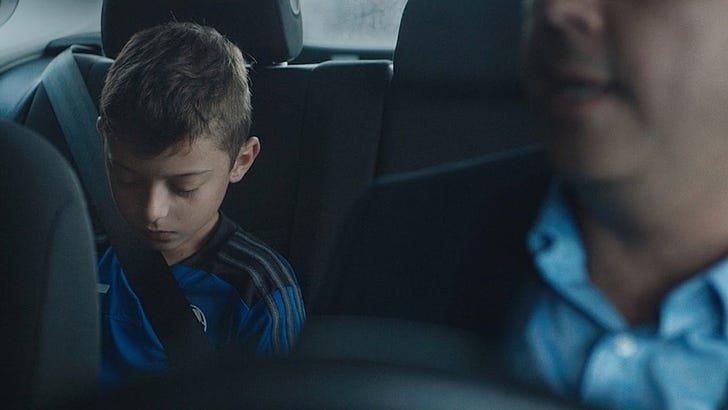We Need to Talk About The Drive Home
We only get to do this drive for so long. Let's cherish it, not knowingly (or unknowingly) strip our kid's love of sports.
Hi friends, been a little off my (Good) Game the past week thanks to a physical illness combined with the mental anguish over the bloodshed in the Middle East. The latter is nowhere near resolved, of course, but since I’m feeling at least physically human again let’s get back to youth sports, shall we?
You know those sports parents. They rarely relax and are almost always visibly upset. They yell at their kids throughout the action. They yell at the refs. They complain about the coaching. They just suck. It would be great if they were herded into some ‘delusional parent’ section while the rest of us chill and calmly enjoy watching our kids play.
Except it’s not remotely that black and white. We all have emotions and want our kids to succeed and sometimes feel their youth sports experience in very piercing ways. Keeping it all in check is key. Unfortunately some parents, usually the delusional ones, have no filter as spotlighted by True Sports heartbreaking campaign called The Ride Home that has recently resurfaced.
I’ve witnessed plenty of unsavory sports parents and this video is basically what I envision is awaiting the kid when they get in the car. Of course this form of berating is going to suck the joy of playing sports from any kid. Of course the attrition rate is rising as youth sports become more professionalized and parents believe each play and each game holds a bigger stake.
I’d still like to believe the scene depicted in The Ride Home video is the extreme. But even the best of us can get wrapped up in the youth sports hamster wheel.
Mark McKinney’s son, Ben, was playing in a golf tournament in upstate Georgia. A freshman in high school at the time, Ben played not only against seniors but the creme de la creme of the state. Ben was excellent on day one played, and Mark let the what ifs enter his brainspace. What if he wins this thing? What if that means he gets invited to a national tourney? What if that means…sky's the limit, right?
Day 2. It was as if Ben had never picked up a club before. He was three putting and hitting the ball out of bounds. The what ifs turned into sheer disappointment for father and son.
Mark, along with another golf dad whose kid rolled in the same circles as Ben, used to laugh at the intense golf dads. How they were so tightly wound. How they thought they knew everything. How they hovered over their kid. Mark and his friend considered coming up with a list of these dads, they were so omnipresent.
After Ben’s disappointing round, the family got in the car and Mark didn’t say a word. He couldn’t shake off the anger and sadness he felt for his son. They met another family at Cracker Barrel, and all Mark could do was order. The silent anger continued as they got back in the car. Mark’s emotions manifested not in words but in aggressive driving. Once Mark hit 95 mph on Interstate 85, his wife Britt had him pull over so she could make a declaration. She told her kids to remember this day, that this was the day their dad became one of those golf dads he used to mock. It was a pivotal moment in Mark’s journey as a sports parent.
“The emotions are coming, and I realized just how much the relationship between you and your child can be damaged,” Mark said.
Mark and Britt soon decided to help other parents avoid that fateful day. In 2021, they released The Drive Home: The Youth Athlete/Parent Dynamic which offers invaluable advice from 38 prominent coaches (including Dabo Swinney), professional and amateur athletes, and business leaders. The two central questions - What’s your best advice for athletes? and What’s your best advice for parents? - elicited a slew of inspiring advice and anecdotes aimed at bridging the emotional disconnect between athletes and their parents. Mark and Britt came away from the project more enlightened than ever. Readers came away with perspectives that shifted the youth sports focus from results to life lessons. And parents came away with tools to reframe their role, including how to have restraint on the car ride home.
Nebraska golf coach Jeanne Sutherland (formally SMU) explained to the McKinneys how her parents had the right priorities.
My parents never treated me like my score. They were happy for me, not with me, when I played well. They were disappointed for me, not in me, when I had rough days. Our supper table was rarely about my results, but often about who I played with, how her mom was doing, who else I saw and what was fun about the day. For my family, sports were about relationships and stories.
Confidence coach Tami Matheny, who we recently featured on Good Game, and who worked with Ben, said that parents should ask their kids these three questions:
What do you want from me before the event/match/game?
What do you want from me during it?
What do you want from me after?
Mark thought Ben was going to say that he wanted his father to analyze his swing during warmups. Instead, Ben said, “I want you to sit on the range with me and not say anything, just be there.” Same for during his round, Ben just wanted his dad there giving the periodic thumbs up. After the round, Ben said he wanted to know his dad’s thoughts but preferred to let the round simmer for a bit first.
After chatting with Mark, I asked my kids the same questions with an emphasis on the car ride home. They gave similar answers to Ben. Please be there for me - my older kid said he wants me to cheer but not be the loudest mom. But once we get in the car the last thing they want to do is talk about the game unless, in their words, ‘I was Him that day.’
I’ve been as guilty as any non-psychopath sports parent on that drive home. I’ll ask the relationship questions as Sutherland’s parents did but then I might sneak in a question like, What did coach say in the postgame meeting? Did anyone look particularly improved in the practice tonight?
That kind of result-oriented probing needs to stop. As coy as I think I’m being, the kids know my M.O. and they don’t like it.
The ride home should be kid led. If they want to chat about some aspect of their practice, let them. If they want to point out an element of their performance, good or bad, let them. If they want our advice on a technical part of their game, let them ask. If they want to vent, cry or laugh, let them.
But if they just want to badger us about dinner or sing along to some T. Swift swift or even just be silent, great. These are special times that are fleeting. The ride home should be a comfort, not an interrogation.





This hits close to home - thanks! Sometimes, however, the ride home is just dead silent. In moments like these, how do you know if your child wants to talk or prefers to be left alone?
Such good points! Great article